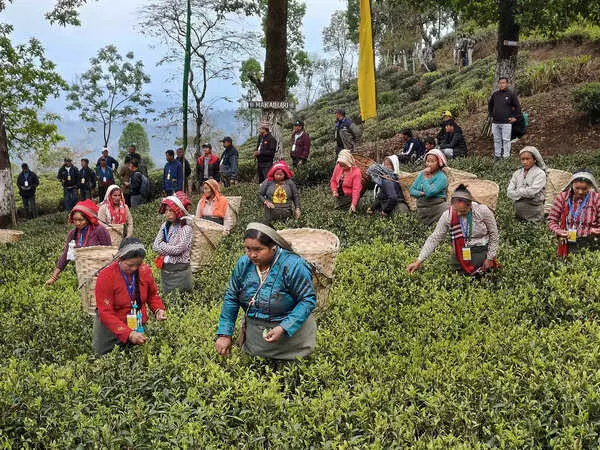
Tea gardens, workers in Darjeeling suffering as result of climate change
text_fieldsDarjeeling/Siliguri: Behind the tranquillity of Darjeeling's renowned tea plantations, where pine trees appear to reach the sky and soft hills extend green, a catastrophe is slowly developing that is almost invisible: climate change is harming production, the flavour of the tea, and the health of hundreds of workers.
The effects of climate change are now unknown and may be as intangible as the frequently incoming mist. However, according to local activists and scientists, it is felt every day.
At the nub of the issue is the use of pesticides and their hydra impact. With extreme weather events becoming more frequent and unpredictable, tea estate owners are desperate to protect their yields.
However, the intensified use of chemical interventions takes a toll on the health of those who work in the gardens and has a bearing on the delicate flavour of the tea leaf and also on yields.
Varsha*, a 34-year-old tea garden worker, doesn’t have a string of degrees, isn’t privy to decision-making in the estate but knows only too well why day-to-day life has become so difficult.
She suffers from breathing difficulties, eczema on her hands and feet, and persistent heaviness in her chest. Despite her many struggles, she perseveres at her job of picking tea leaves.
“In the last few years, many tea estate owners have resorted to ramping up the use of pesticides and insecticides to boost tea production, which has been declining due to droughts, erratic rains, and increased pest attacks.” “We are forced to spray these chemicals without any gloves or masks,” she said.
Chemical pesticides are wreaking havoc on her colleague Mamata’s* health too.
The 29-year-old, who works in the same garden, collecting leaves, drying them and spraying herbicides and pesticides on them, has developed asthma in the last few months.
“The doctors say it might be because of the continuous inhalation of chemicals. We need special masks during spraying of pesticides which are expensive and also not easily available. We have raised this issue several times with the managers but have not received any help yet,” she said.
In the sprawling tea belt that covers Siliguri and the Dooars, the stories are plenty.
While some gardens provide protective gear such as gloves and masks, there are many that don’t.
In the sprawling tea belt that covers Siliguri and the Dooars, the stories are plenty.
While some gardens provide protective gear such as gloves and masks, there are many that don’t.
Prolonged exposure to chemicals can even turn fatal in the long term with debilitating diseases, including cancer, causing severe damage to organs, said Dr.Amit Deshpande, founder and director, of Activist Healthcare.
PTI reached out via email to the Tea Board of India chairperson on Thursday for a response but received no response till the filing of this report.
The number of workers employed in tea gardens varies in accordance with the size of the garden. Small tea gardens employ about 250 tea workers, medium sized 600 while a large estate can have more than 900 employees.
The issues go beyond the health risks faced by tea estate workers.
Rupa Choudhary, meticulously examining the newly picked tea leaves, laments the decline in production.
“The first flush, which used to bring abundant tea production during March and April, has significantly reduced due to droughts,” Choudhary, who is tasked with weighing and sifting through dried leaves, said.
The changing weather patterns have made it increasingly challenging to harvest even two kilograms per day of high-quality tea leaves, a fraction of the six-seven kilograms per day till 2015.
The implications of climate change ripple through every aspect of their lives. The consequences of diminishing tea yields, for instance, reflect in their salaries.
“Daily, we earn only Rs 235, which is barely enough to make ends meet. The rising costs of vegetables and other essential items make it even more difficult to provide for our families.” Tea estate managers Sandeep Kumar Gupta and Partho Das Roy, who work in the Dooars and Siliguri, echo the sentiments of the workers.
According to Gupta, irrigation costs have soared due to insufficient rainfall, resulting in both decreased quantity and quality.
“The quality has suffered badly, Darjeeling tea is famous but now it feels like it is losing its authentic taste and that is being felt by us as exports have nose-dived,” he said.
He, however, denied using excess chemicals to increase production, saying even pesticides and insecticides can’t do much so it is better to not pollute the estate with them.
Roy added that the market value of the first flush, known for its pure and fresh taste, has suffered the most.
The scarcity of winter rains and the failure of new buds and leaves to grow have resulted in a loss of the distinctive bitter flavour.
“The effects of climate change on tea production are intertwined with the unique characteristics of Darjeeling tea itself. The region’s misty hills, fertile soil, and ample rainfall have historically provided the perfect conditions for growing exceptional tea. However, as erratic weather patterns persist, the prized flavours associated with different tea flushes are at risk,” Roy said.
The second flush, with its muscatel and fruity notes, and the monsoon flush, offering a bolder flavour, have also been affected. The autumnal flush, the last harvest before winter, attempts to salvage the flavours but faces its own challenges, according to experts.
Production volumes of the 87-odd Darjeeling tea gardens, which used to be in the region of more than 8 million kilograms per year in 2016, have plummeted to 6.5-7 million kilograms in 2022, primarily due to old bushes, climate change and pest attacks, planters said.
“Both production and price realisations have fallen in Darjeeling,” Indian Tea Association secretary general Arijit Raha said. The average auction price of the crop, which was Rs 365.45 per kilogram in 2021, fell to Rs 349.42 in 2022, he added.
According to industry estimates, the Darjeeling tea industry employs around 55,000 permanent staff and 15,000 temporary workers.
As climate change tightens its grip over the tea lands of Darjeeling, the one question that industry insiders grapple with is this — how can the situation be salvaged? Darjeeling Tea Research & Management Association Director Kaushik Bhattacharya stressed the importance of maintaining the soil’s organic balance, using proper shade trees, and ensuring a balance between seed-grown and clonal tea plants.
Bhattacharya also highlighted the need to address soil pH levels and the management of pests and fungal diseases.
Bharat Prakash Rai, secretary at the FOSEP (Forum for Sustainable Environment and People), Darjeeling, added that the adverse effects of pesticide misuse and bad practices are also contributing to the accelerating impact of climate change.
In his view, tea garden producers prioritise quantity over quality, resulting in damage to the environment and flora and fauna.
“Above the tea bushes there must be a good forest that captures water vapour and gives moisture to the tea gardens. However, to increase areas of production these forests have been razed. In addition, the weather has become very dry and there is acute water scarcity in tea gardens,” Rai said
“Furthermore, the widespread use of sticky substances to trap pests has unintended consequences. While these substances helped protect tea plants, they also hindered pollination and, ultimately, tea production. The delicate balance between pest control and environmental sustainability needs to be maintained,” he said.
The sticky substance he refers to is a glue-like substance applied to the trunk of trees to catch and trap insects, preventing them from climbing up and damaging the tree or its foliage.
(*Names have been changed to protect identity).
With PTI inputs
























